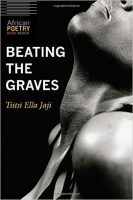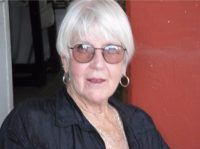March 9, 2017
Edited by David Sanders
Specimen Days
1814—Taras Shevchenko, Ukraine, national poet/painter/prof of Kiev [NS], is born.
1892—Joseph Weinheber, Austria poet/writer (Adel und Untergang), is born.
1892—Vita Sackville-West, English novelist, poet (The Land) and gardener (Sissinghurst), is born.
1905—Rex Warner, English poet/writer (Wild Goose Chase), is born.
1910—Ed[uard] Hoornik, Dutch writer/poet (Survivor), is born.
1994—Charles Bukowski, author/poet, dies of leukemia at 73.

I walked away from the mirror.
it was morning, it was afternoon, it was
night
nothing changed
it was locked in place.
something flashed, something broke, something
remained.
I walked down the stairway and
into it.
—from “Cut While Shaving” by Charles Bukowski
“I walked away from the mirror. / it was morning, it was afternoon, it was / night / nothing changed” – Charles Bukowski
World Poetry
Unemployed Indigenous Poet Ali Cobby Eckermann Wins $215,000 Literary Prize

Now unemployed and living in a caravan in Adelaide, the Indigenous Australian poet Ali Cobby Eckermann says she “pretty much just cried a lot” when she received an email on Thursday notifying her that she had won a literary prize of US$165,000 (A$215,000). “It’s going to change my life completely,” she told Guardian Australia after being awarded a Windham-Campbell prize. “I’m pretty emotional.”
Unemployed, indeigenous Australian poet Ali Cobby Eckermann was awarded the $215,000 Windham-Campbell prize.
Recent Reviews
Rebecca Watts, The Met Office Advises Caution
by Lucy Winrow
The delicate cover illustration of The Met Office Advises Caution features a tiny figure outside a burning house, clinging to another figure as it floats away. The scene is arranged in a circular pattern of wispy flowers and birds that – depending on their position – appear to be flying or falling. It well reflects the ambivalence and fragility of human experience that Rebecca Watts explores in her debut collection: the life-death cycle and the relationship between the human and natural world. Watts has described being drawn to animals: “their un-self consciousness and their (in the main) indifference to me is liberating.” It seems that against the backdrop of the natural world, Watts finds the freedom to probe unsettling thoughts and emotions.
Whereas By Layli Long Soldier
by Dean Rader
Few Americans seem to know much about the Indian Occupation of Alcatraz, and fewer still are acquainted with the Occupation’s “Proclamation,” a masterful document that deploys the language, diction, and vocabulary of unfair treaties and paternalism against the government that initiated those treaties. It stands as one of the great examples of rhetorical resistance in American writing. Layli Long Soldier’s Whereas reminds me of the Proclamation and other proclamatory documents authored by Indigenous writers on Alcatraz and since. But, even better, Whereas also happens to be one of the most innovative collections of poetry I’ve come across in a long time.
On Bernadette Mayer’s Works & Days
by Michael Miller

In “Could You Bring the Wine?,” a poem collected in her 2016 book Works & Days, Bernadette Mayer writes: “Soon we’ll be free-vores and / Dumpster-dive and glean.” The quote nods to Mayer’s low-paying line of work, and is one of the book’s many barbed observations about the distribution of wealth in the US. But it’s also a pretty good description of the omnivorous sensibility on display here: Mayer expertly Dumpster-dives into a rich heap of cultural history, alluding to works from writers and artists ranging from Sir Thomas Browne to Bill Haley and the Comets.
On Robert Pinsky’s ‘At the Foundling Hospital’
by David Biespiel
At the Foundling Hospital, Robert Pinsky’s compressed, resonant collection — part treatise on mixed registers of high and low language, part menagerie of narratives, part ceremony of names and songs, part documentary on improvisation and the lyric — is built around an archive of nimble, historical, and private evocations. The poems explore. And by explore I mean they inspect, probe, and research; they draw from their materials, whether it’s an instrument, a name, a token, a haftorah portion, a city, a dream, a robot, or a language; and they complement those unearthed things with an enduring retrospection that comes from clear thinking, narrative directness, integrity, and a feel for the percussive incantation.
A Poet’s Pathologies: Inside Robert Lowell’s Restless Mind
by Patricia Bosworth
On Sept. 12, 1977, Robert Lowell, the most distinguished American postwar poet, died quietly and very suddenly in the back seat of a Manhattan yellow cab. He was 60 years old. A towering figure in the world of letters — a two-time Pulitzer winner and the successor to Ezra Pound — Lowell carved a niche with reams of innovative poetry he churned out in bold, often experimental styles. His subjects were wide-ranging and epic: the Greek myths, the American Revolution. Fire is a recurring motif, along with themes like good and evil or friendship and death.
Mayer Dumpster-dives into cultural history, alluding to works ranging from Sir Thomas Browne to Bill Haley and the Comets.
Broadsides
A Gallery of Rhymes from Palgrave’s Golden Treasury, Book I
by Anthony Madrid
Spring, the sweet Spring, is the year’s pleasant king;
Then blooms each thing, then maids dance in a ring,
Cold doth not sting, the pretty birds do sing,
Cuckoo, jug-jug, pu-we, to-witta-woo!
This is the first stanza of a short poem by Thomas Nash. I have “bolded” the rhyme words, as I shall be doing throughout these notes. The poem first appeared in Summer’s Last Will and Testament (1592), a play that no one has read in hundreds of years. The poem occurs near the beginning of the play. It is a song. There is another poem from Summer’s Last Will that is more famous nowadays, I mean the one with the refrain “I am sick, I must die. / Lord have mercy on us.” Naturally, it occurs at the end of the play.
Robert Lowell at 100: Why His Poetry Has Never Been More Relevant
by Max Liu
‘I was born under the shadow of the Dome of the Boston State House,” wrote the poet Robert Lowell, “and under Pisces, the Fish, on the first of March, 1917.” With his aristocratic background – all the inherited furniture and ancestral portraits surrounding him as a child, as he recalled in the memoir 91 Revere Street – perhaps it’s no surprise, reading Lowell 100 years after his birth, that he was often preoccupied with the passing of time. “Thirty-one / Nothing done,” he writes in 1948. A decade later: “These are the tranquillized Fifties, / and I am forty.” In the elegiac Grandparents, he stands over his late grandfather’s billiards table and contemplates his own “life-lease”.
“I was born under the shadow of the Dome of the Boston State House,” wrote the poet Robert Lowell.
Drafts & Fragments
Filmmaker Uses Whitman Poetry To Explore American Identity

Filmmaker Jennifer Crandall spent the last two years traveling around Alabama, asking unsuspecting strangers to read from Walt Whitman’s 1855 poem “Song of Myself.” Each of the poem’s 52 stanzas is read by a different person, family or group of friends. The readings are now being compiled into a web-based project called “Whitman, Alabama,” which explores American identity in the state. Here & Now‘s Eric Westervelt (@Ericnpr) talks with Crandall (@JennCrandall) about the project and its inspiration.
Filmmaker Jennifer Crandall spent two years traveling Alabama, asking strangers to read Whitman’s 1855 poem “Song of Myself.”
Poetry In the News
Carl Phillips Chooses Duy Doan as 2017 Yale Series of Younger Poets Winner for We Play a Game
Yale University Press is pleased to announce a winner in the 2017 Yale Series of Younger Poets competition. The judge, prize-winning and critically acclaimed poet Carl Phillips, has chosen Duy Doan’s manuscript, We Play a Game. Series judge Carl Phillips says: “If games figure in Duy Doan’s We Play a Game, they do so much more seriously, and resonantly, than the title alone suggests. For game here can mean as well the strategies for weathering those parts of society that threaten identity itself, at the level of gender (in all its fluidity), or race, of family as history and tradition – of language, too, and our expectations for it. Wide- ranging in subject, Doan’s poems include boxing, tongue twisters, hedgehogs, Billy Holiday, soccer and, hardly least of all, a Vietnamese heritage that butts up against an American upbringing in ways at once comic, estranging, off-kiltering. Doan negotiates the distance between surviving and thriving, and offers here his own form of meditation on, ultimately, childhood, history, culture – who we are, and how – refusing all along to romanticize any of it.”
Introducing The New Yorker Poetry Bot
To celebrate the magazine’s ninety-second anniversary, we are introducing The New Yorker Poetry Bot, a new way to receive, read, listen to, and share poetry. Starting today, our poetry bot, available on Twitter and Facebook Messenger, will send out a poem at random every day for the next ninety-two days. The selection—culled from our archive and curated by our poetry editor, Paul Muldoon, and poetry coördinator, Elisabeth Denison—includes poems by Audre Lorde, Joseph Brodsky, and Ada Limón.
Duy Doan is the winner of the 2017 Yale Series of Younger Poets competition.
New Books
Beating the Graves by Tsitsi Ella Jaji
[Paperback] University of Nebraska Press, 114 pp., $15.95

The poems in Tsitsi Ella Jaji’s Beating the Graves meditate on the meaning of living in diaspora, an experience increasingly common among contemporary Zimbabweans. Vivid evocations of the landscape of Zimbabwe filter critiques of contemporary political conditions and ecological challenges, veiled in the multiple meanings of poetic metaphor. Many poems explore the genre of praise poetry, which in Shona culture is a form of social currency for greeting elders and peers with a recitation of the characteristics of one’s clan. Others reflect on how diasporic life shapes family relations.
Cold Pastoral: Poems by Rebecca Dunham
[Paperback] Milkweed Editions, 80 pp., $16.00
A searing, urgent collection of poems that brings the lyric and documentary together in unparalleled ways―unmasking and examining the specter of manmade disaster. The explosion on the Deepwater Horizon oil rig. Hurricane Katrina. The Flint water crisis. Thousands dead, lives destroyed, and a natural world imperiled by human choices. This is the litany of our time―and these are the events that Rebecca Dunham traces, passionately and brilliantly, in Cold Pastoral. In poems that incorporate interviews and excerpts from government documents and other sources―poems that adopt the pastoral and elegiac traditions in a landscape where “I can’t see the bugs; I don’t hear the birds”―Dunham finds the intersection between moral witness and shattering art. Experimental and incisive, Cold Pastoral is a collection that reveals what poetry can―and, perhaps, should―be, reflecting ourselves and our world back with gorgeous clarity.
The Apollonia Poems by Judith Vollmer
[Paperback] University of Wisconsin Press, 88 pp., $14.95
Traversing time, cities, and voices, The Apollonia Poems finds its central aesthetic in place: physical and locational, perceptual and imagined. Judith Vollmer's poet-wanderer explores the layered terrains of urban environments from Pittsburgh to the Mediterranean to the Carpathians. Employing narratives and lyrics, songs and reports, and a short verse-play in three voices, Vollmer's meditations are by turns elegiac and celebratory, colloquial and lyrical.
What it Done to Us: Poems by Essy Stone
[Paperback] Lost Horse Press, 70 pp., $18.00
What it Done to Us, by Essy Stone, is a poetry of narrative tension, sense of place, and with a wide-angle scan of lyrical language. There is a landscape here, the depiction of Appalachia, a beautiful backdrop of loves and struggles with violence, poverty and all its minions such as drugs and crime, and its religion. Stone has created a southern gothic for today, a testament, a collection that could be the mythology that we find at the intersection of flesh and spirit, or maybe it's the reveal to a hard-times question like, "Why does the Devil get here faster than God every time?" This is a tough community that Stone, with a deft touch of empathy and eloquence, shows us and we begin to know these folk. These poems are understated but highly charged vignettes from the hollers, a shadow world of the embattled folk who bear up and just do what needs done without apology. This is a stunning debut collection, and it is our introduction to an amazing poet.
Penumbra: Poems by Michael Shewmaker
[Paperback] Ohio University Press ,72 pp., $16.95
This powerful debut collection explores the half-shadows of a world torn between faith and doubt. From intricate descriptions of the rooms in a dollhouse, to the stark depiction of a chapel made of bones, from pre-elegies for a ghostly father, to his compelling treatment of his obsessed, human characters (a pastor, a tattoo artist, a sleepwalker, to name only a few), these are poems that wrestle with what it means to believe in something beyond one's own mortality. Learned and formally adept, these poems consist of equal parts praise and despair. They announce Shewmaker as an important new voice in American poetry.
The poems in Tsitsi Ella Jaji’s Beating the Graves meditate on the meaning of living in diaspora.
Correspondences
Seven Questions for Kate Greenstreet
by Rob McLennan
Kate Greenstreet’s new book The End of Something is forthcoming from Ahsahta Press in 2017. Her previous books are Young Tambling, The Last 4 Things, and case sensitive, also with Ahsahta.
Everyone Counts: Some Questions for Joanne Kyger
by Hailey Higdon

Joanne Kyger invites everyone in. Her attention to the present is not without acknowledgment of the history that focuses her lens. I first read her collected poems ABOUT NOW cover-to-cover in one long summer day in 2007. Kyger’s newest collection, THERE YOU ARE, combines 40 years of interviews, letters, poems, and journals edited by Cedar Sigo. It is forthcoming from Wave Books in the fall of 2017.
Joanne Kyger’s newest collection, THERE YOU ARE, combines 40 years of interviews, letters, poems, and journals.
Envoi: Editor’s Notes
Two Poets, Two Poems
Robert Lowell's poem "Skunk Hour" is dedicated to Elizabeth Bishop. Bishop's poem "The Armadillo" is dedicated to Lowell. Lowell said he dedicated his poem to Bishop because "when I began writing 'Skunk Hour', I felt that most of what I knew about writing was a hindrance. The dedication is to Elizabeth Bishop, because re-reading her suggested a way of breaking through the shell of my old manner." The poem was written after he had read "The Armadillo," which he thought one of her best. As with his "translations," this poem is in a sense an imitation, not of a poem from a different language but rather one from a different sensibility.
Likewise, her poem carries a dedication to him. This was not the case when it was first published in the New Yorker in 1957. Some critics point to Lowell's conscientious objector status as an indication that "The Armadillo" is an anti-war poem; that reading seems dubious. The fact is that it was not until after the publication of "Skunk Hour" in 1958 in The Partisan Review (and subsequently in Lowell's Life Studies in 1959), which carried its dedication to her, that she added the dedication to Lowell to her own poem. The first time then that it carried the dedication would have been with the 1965 publication of her book Questions of Travel. Even the New Yorker in an article referring to the correspondence of the two poets, seems to have gotten it wrong (Bishop dedicated “The Armadillo” (“O falling fire and piercing cry”) to Lowell, who in turn wrote “Skunk Hour,” (“white stripes, moonstruck eyes’ red fire”) for Bishop.).
More likely is the case that Bishop dedicated it to her friend because he so admired it and had thought to dedicate to her one of his most famous poems, which was itself a response to her poem. To trade on his draft status for the sake of a poem's meaning, publication chronology aside, strikes me as out of character for her.
The first of this month marks the centennial of Robert Lowell's birth.
Robert Lowell’s poem “Skunk Hour” is dedicated to Elizabeth Bishop. Bishop’s poem “The Armadillo” is dedicated to Lowell.